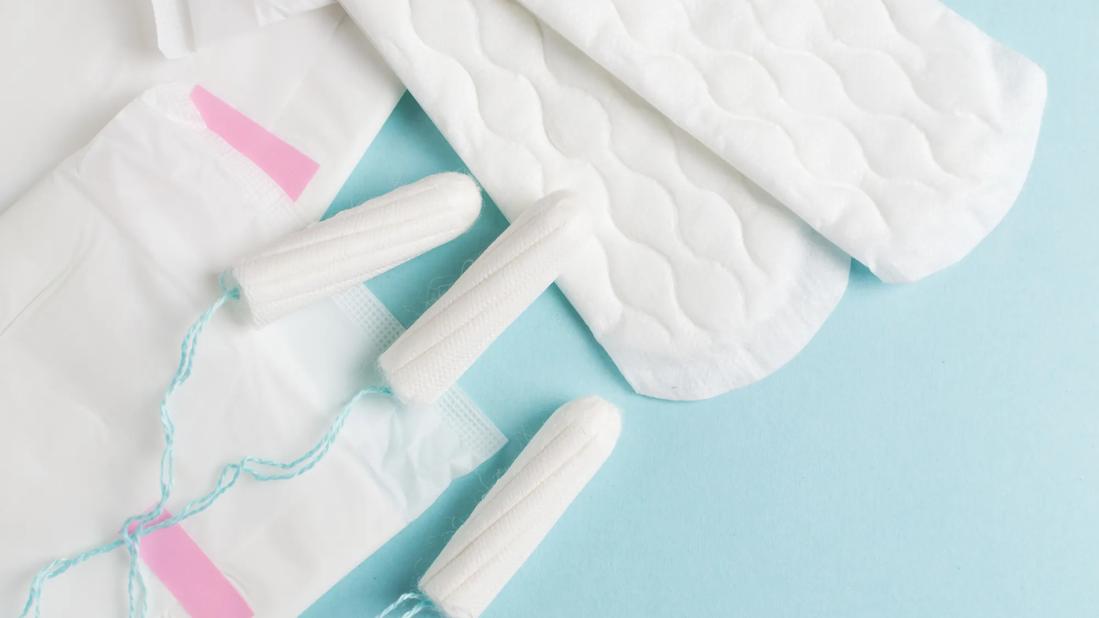Nothing scented should go in or around your vagina!

Image content: This image is available to view online.
View image online (https://assets.clevelandclinic.org/transform/dbfc79d6-be72-4499-bcc7-f422184d1930/scented-tampons-pads-695294000)
Assorted pads and tampons on light teal background
Have you ever heard the phrase “The vagina is a self-cleaning oven”? It’s true.
Advertisement
Cleveland Clinic is a non-profit academic medical center. Advertising on our site helps support our mission. We do not endorse non-Cleveland Clinic products or services. Policy
Your vagina, with its complex balance of bacteria, is constantly washing away its own naturally renewing cells and microorganisms, even during menstruation.
So, you don’t need to use scented tampons or pads to keep it clean or hide smells. In fact, scented menstrual products can cause health problems.
Scented tampons and pads are menstrual products that are infused with fragrances. They’re marketed as being able to manage menstrual bleeding — and cover up any odors associated with it.
But wait a sec: Menstrual blood is a normal bodily function, not a sign of an unclean vagina. And as you go about your everyday life, no one can smell that you’re on your period!
“The idea that the vagina is dirty and needs to be cleaned is simply not true,” states women’s health specialist Sara Youngblood, CNP.
So, why do scented tampons and pads even exist? Youngblood says these products (and others, like douches) play on women’s insecurities that something is wrong with our bodies — namely, the idea that vaginas are smelly.
“Women have been told this for centuries,” she says, “and it’s not only causing unnecessary distress. It’s also a dangerous message to send.”
Introducing chemicals and fragrance to one of the most sensitive areas of your body can upset its balance of bacteria and disrupt its pH levels.
Advertisement
“Scented feminine products aren’t just unnecessary,” Youngblood cautions. “In fact, they actually interfere with your body’s natural cleaning processes.”
Let’s take a deeper look at the risks of using scented period products.
Scented tampons and pads can upset the bacterial environment in your vagina, giving bad bacteria the upper hand.
Lactobacillus is a type of good bacteria that lives in your vagina. It helps protect you from infection and disease-causing organisms, like bacterial vaginosis and yeast infections.
Putting a disruptive foreign body — like a scented tampon — into your vagina can lead to an overgrowth of bad bacteria that may cause:
The lactobacilli in your vagina produce lactic acid, a naturally occurring substance that helps your vagina stay slightly acidic. This is known as your pH level. But the chemicals in scented menstrual products can change your pH level.
Why does that matter? Because the acidity level of your vagina is key to keeping it healthy. Having a slightly acidic vagina helps keep the balance of bacteria and yeast in check. But when your pH level changes, it throws off that delicate balance — and raises your risk of infection.
We can’t emphasize this strongly enough: All vaginas have a little bit of an odor, which is normal and healthy. But a strong, unpleasant smell (like fishiness or mustiness) can be a sign of a health concern like vaginitis — a condition that’s causing your vagina to become irritated or inflamed.
“Covering up vaginal odor with a scented product can be dangerous,” Youngblood warns. “It’s always better to see a physician and have an evaluation to determine the most likely culprit, rather than covering it up with fragrance.”
Don’t be fooled: So-called “herbal-infused” pads are just scented pads, marketed differently. And they come with all the same risks as other scented menstrual products, including allergic reactions and infections like bacterial vaginosis.
Such products typically include essential oils like:
Herbal-infused pads are marketed as creating a cooling sensation that makes your period more comfortable. That could be true — but the ingredients just aren’t ones you should use near such sensitive body parts.
“Organic fragrances are still fragrances,” Youngblood stresses. “Using essential oils near the vagina can cause all the same problems as other types of fragrances.”
Advertisement
Scented tampons and pads aren’t as common as they used to be, but they are still available on shelves.
“It’s alarming that products designed to be placed in or near the vagina aren’t required to have more comprehensive labeling,” Youngblood reflects.
So, what should you look for instead? When you’re shopping for menstrual products:
If you’ve tried a scented pad or tampon and are experiencing itchiness or irritation, stop using scented products ASAP and wait for your symptoms to clear up.
“Your vagina will typically revert to its natural state in a day or two,” Youngblood says. “If it doesn’t, make an appointment with a healthcare provider to get things checked out.”
Advertisement
And whatever menstrual product you choose to manage your flow going forward, remember: You don’t need scented products to keep your vagina clean. It does that all by itself!
Advertisement

Sign up for our Health Essentials emails for expert guidance on nutrition, fitness, sleep, skin care and more.
Learn more about our editorial process.
Advertisement
It’s important to angle it toward your rectum or back, along the natural curve of your vaginal canal
Yes, you can pee with a tampon in; no, they won’t stretch out your vagina or make cramps worse!
It depends on your menstrual flow, and a little trial and error
Yes, with the right absorbency level and maximum time-frame
Homemade doesn't always mean safe
From using one at night to how often you should change them
Use them within five years and store them someplace cool and dry
In addition to toxic shock syndrome, you risk other vaginal infections
Prioritize your health by managing stress, strengthening your social connections and getting quality sleep
Bolsters, blankets, pillows and blocks can offer extra support, stability and comfort
Allergies, postnasal drip, asthma or reflux could be to blame for a cough that won’t quit